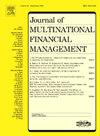Is the relationship between financial globalization and financial stability heterogeneous? Evidence from emerging markets and developing economies
IF 4
3区 经济学
Q2 BUSINESS, FINANCE
Journal of Multinational Financial Management
Pub Date : 2025-01-31
DOI:10.1016/j.mulfin.2025.100899
引用次数: 0
Abstract
This paper examines the association between financial stability and financial globalization for 59 emerging markets and developing countries (EMDEs) from 2000 to 2019. Our findings from the baseline model reveal that the relationship between financial stability and financial globalization varies, depending on dimensions of financial globalization (overall, de facto, de jure) and financial stability. The relationship shows nonlinear and heterogeneous patterns across quantiles of financial stability, characterized by well-defined extreme points within the data range. Specifically, by employing panel quantile regression technique, we find that financially unstable countries (lower quantiles of financial stability) exhibit a U-shaped relationship between dimensions of financial globalization and financial stability. In comparison, an inverted U-shaped relationship appears for financially stable countries. Further, we find that countries with weak institutional and financial development exhibit U-shaped relations, experiencing initial instability followed by stability. Conversely, financial stability initially improves for countries with strong institutional and financial development but declines as integration deepens. These findings underscore the importance of strengthening institutions to harness the benefits of financial globalization while mitigating associated risks.
金融全球化与金融稳定的关系是异质性的吗?来自新兴市场和发展中经济体的证据
本文考察了2000年至2019年59个新兴市场和发展中国家(EMDEs)金融稳定与金融全球化之间的关系。基线模型的研究结果表明,金融稳定与金融全球化之间的关系因金融全球化(总体上、事实上、法律上)和金融稳定的维度而有所不同。这种关系在金融稳定性的分位数中显示出非线性和异质模式,其特征是数据范围内定义明确的极值点。具体而言,通过面板分位数回归技术,我们发现金融不稳定国家(金融稳定的较低分位数)的金融全球化维度与金融稳定之间呈现u型关系。相比之下,金融稳定的国家则呈现倒u型关系。此外,我们发现制度和金融发展较弱的国家表现出u型关系,经历了最初的不稳定之后的稳定。相反,在制度和金融发展强劲的国家,金融稳定性最初有所改善,但随着一体化的加深而下降。这些发现强调了加强制度的重要性,以利用金融全球化的好处,同时减轻相关风险。
本文章由计算机程序翻译,如有差异,请以英文原文为准。
求助全文
约1分钟内获得全文
求助全文
来源期刊

Journal of Multinational Financial Management
BUSINESS, FINANCE-
CiteScore
7.30
自引率
4.80%
发文量
25
审稿时长
30 days
期刊介绍:
International trade, financing and investments have grown at an extremely rapid pace in recent years, and the operations of corporations have become increasingly multinationalized. Corporate executives buying and selling goods and services, and making financing and investment decisions across national boundaries, have developed policies and procedures for managing cash flows denominated in foreign currencies. These policies and procedures, and the related managerial actions of executives, change as new relevant information becomes available. The purpose of the Journal of Multinational Financial Management is to publish rigorous, original articles dealing with the management of the multinational enterprise. Theoretical, conceptual, and empirical papers providing meaningful insights into the subject areas will be considered. The following topic areas, although not exhaustive, are representative of the coverage in this Journal. • Foreign exchange risk management • International capital budgeting • Forecasting exchange rates • Foreign direct investment • Hedging strategies • Cost of capital • Managing transaction exposure • Political risk assessment • International working capital management • International financial planning • International tax management • International diversification • Transfer pricing strategies • International liability management • International mergers.
 求助内容:
求助内容: 应助结果提醒方式:
应助结果提醒方式:


